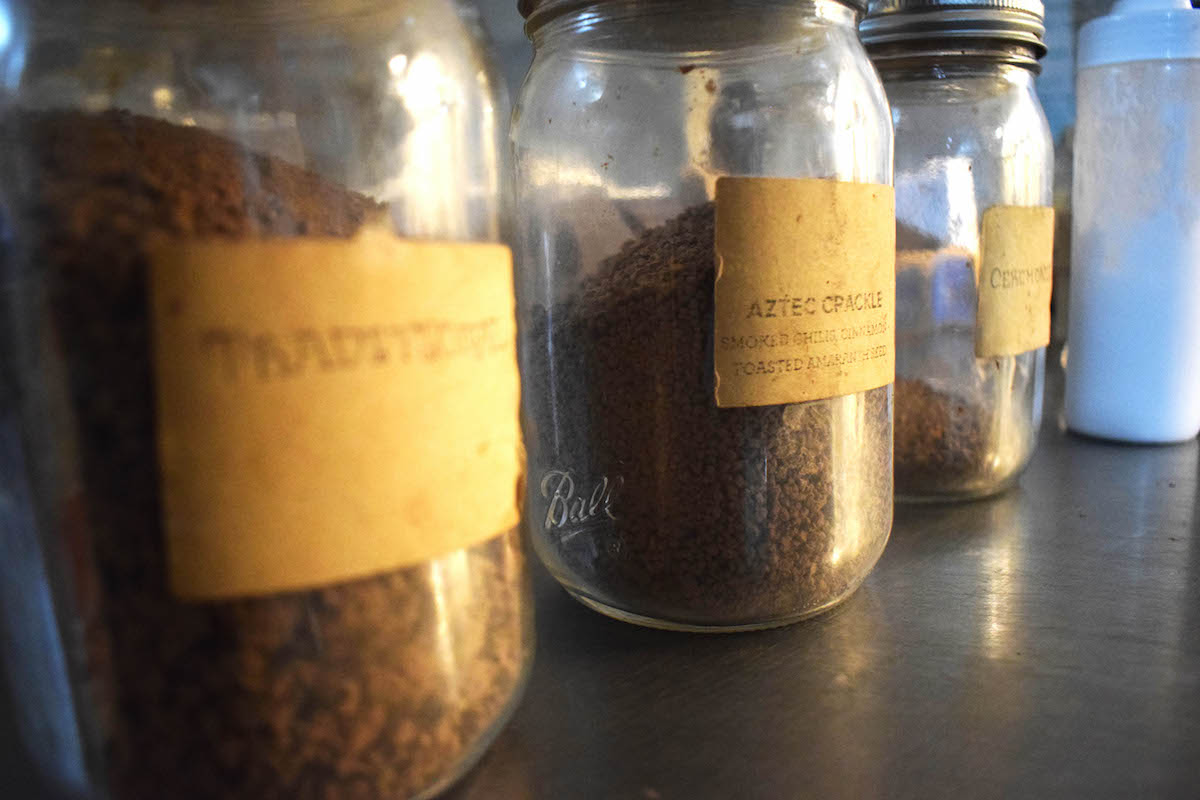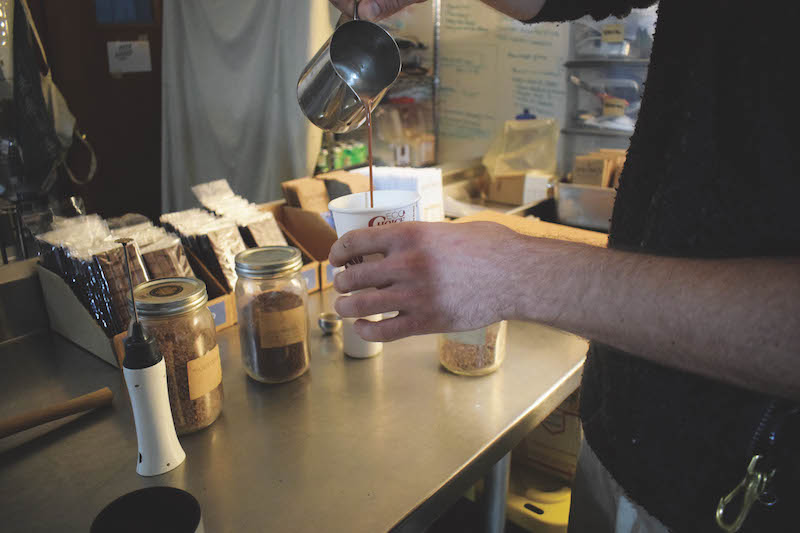Oliver Holecek acquired his first selection of cacao beans from a few farmers in a remote Costa Rican cafe in 2017. He paid them discreetly with money he earned from the local market, where he sold a vendor 15 lbs. of chaga mushrooms—often used in folk medicine—he brought from the United States. It was his first direct contact with harvesters of the prized bean, and he’s maintained that local connection to Central and South American farmers ever since.
He and his cousin, Jay Holecek (who works from California roasting cacao beans), operate Primo Botanica, the first bean-to-bar chocolate makers in the Capital Region. The cousins have been traveling and working on urban and tropical farms and cooking with chocolate and other goods for the past decade. Now Oliver is developing unique and culturally relevant flavors in kitchen in Mount Ida Preservation Hall in Troy.
Typically Oliver chooses the cacao flavors, his cousin comes up with the roasting profiles and sends him samples. “I taste it and then that’s when I figured out what goes with what: fruity with fruity or trying to contrast fruitiness, trying to really create balanced flavors,” he explains.
Sometimes he starts with “a really cool ingredient, like lavender from Lavenlair Farm in Whitehall, near Lake George. “Their particular lavender has a certain flavor compared to others, so I want to figure out what kinds of chocolate like that,” he says. “It’s a lot easier for these ingredients to kind of just find me rather than having to go find them.”
In the small cooking and storage space Holecek experiments with flavors and ingredients to mixed into the chocolate. The back wall is lined with jars of chiles, chamomile, chocolate mint CBD oil, Incan gooseberries and cinnamon, tejate, dried figs and more. The mixed chocolate is molded and packaged by hand, in compostable plastic wrappers and a thick paper casing slapped with a colorful sticker depicting the chocolate type and a stamp of their brand, designed by Troy artist Zach Higgins.
“From the beginning I wanted to be able to make something awesome without having to invest a huge amount of money in it, and I think like a lot of the best things are like that,” Holacek says. “I just want people to focus on the chocolate, but then at the same time, to be able to promote the quality of it.”
Holacek started Primo Botanica with the goal to “never buy chocolate again,” instead, making his own from scratch. He buys cacao beans directly from single origin (the ingredients are sourced from a particular geographical area of specific farms and regenerative farmer-owned cooperatives) farms in Guatemala, Ecuador, Peru and, until recently, Tanzania. (The chocolatier has opted to focus on Central and South American cacao for the future of his brand.)

His new goal is to make high-quality, sustainable chocolate a beloved craft product, the way beer and coffee are viewed.
“A lot of people ask me what it’s for or ‘How do you use it?…How do I drink it?,’ but it’s a chocolate bar,” he says. “I make a bunch of drinks at the farmers market and the idea was that I’m promoting a use of the chocolate bar, but I don’t think that message is conveyed very well. I think it’s seen as two separate things. The main thing is people not being used to making chocolate drinks, culturally.”
Holacek has been teaching classes on chocolate making at The Arts Center of the Capital Region in Troy, showing students his process, incorporating seasonal ingredients and hand tempering the chocolate using tools like vacuums and hair dryers.
The chocolate company has been a passion project for Holocek that has also helped him to pay his bills while allowing him to stay involved in the local community. He resides in the Basswood Living Cooperative, where he likes to help out, and is on the nonprofit board for the Mount Ida Preservation Association, where he helps with grant writing. He enjoys talking to Primo customers at his Troy Farmers Market tent each Saturday and is involved with Troy makers and artistic community groups.
Holecek says Primo Botanica has also helped him come to terms with his role as “a typical white guy” as he has found a way to serve communities that were colonized and oppressed for centuries.
“This is kind of a way to support those people,” he says. “The beans that I’m buying are going directly to indigenous peoples, and the spices I’m buying. I’m hoping that [the chocolate is] educating people a little bit more on what flavors are actually from Central and South America. All these things that we think of as very European are not that way at all.”
He has a clear idea of a dream kitchen: large enough to store his material and equipment, with marble countertops and good lighting to make videos of chocolate drink tutorials. But Holacek is intent on keeping Primo Botanica small enough that he can continue to support the small farms he sources from. He also wants time to travel and explore new flavors and ingredients.
In the kitchen, he measures out spoonfuls of broken up chocolate, blends them down and pours hot water over the top, turning the mixture into a frothy and fragrant drink with a kick.
“The chocolate bar tasting movement has had a really hard time because we’re selling our bars for anywhere from $6 to $15, but I think that’s where people are confused about how it’s used,” he says. “But if you think of a bar of chocolate the same way you think of a small bag of coffee, it’s a lot more reasonable.”
Stop by Primo Botanica at the Troy Waterfront Farmers Market on Wednesdays (4 PM to 7 PM) and Saturdays (9 AM – 2 PM) at Monument Square and the Troy Atrium (starting Nov. 2) to try the Ceremony blend, a toasty sipping drink from the Ecuadorian origin inspired by ceremonially prepared chocolate with native spices; the Tanzanian Traditional blend, a warm, sweet crowd favorite; or the Aztec Crackle, made from their Guatemalan origin.
Chocolate lovers can also pick up bars to eat or prepare as a drink in local shops including Troy’s Superior Merchandise Company, Stacks Espresso and River Garden Studio, Albany’s Honest Weight Food Coop, Brewtus Coffee Roasters, The Book House or Stacks Espresso, Schenectady’s The Dilly Bean, Saratoga’s Putnam Market, Hudson’s Verdigris Chocolate and Tea and more.





